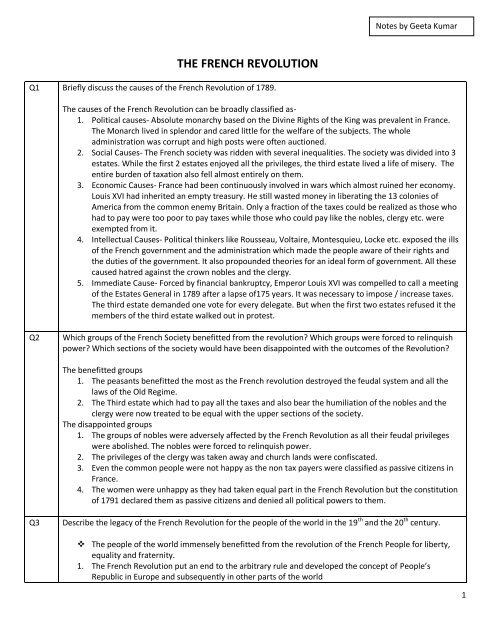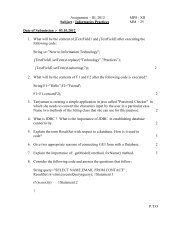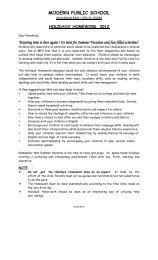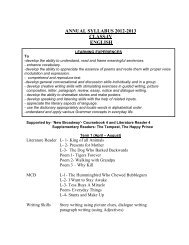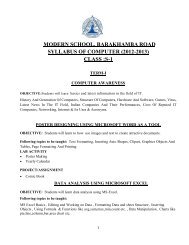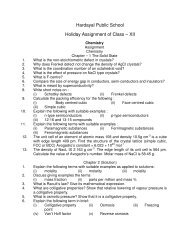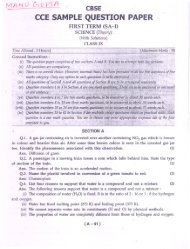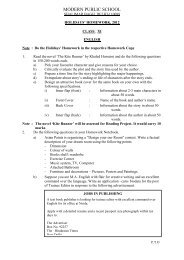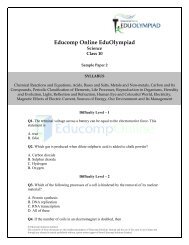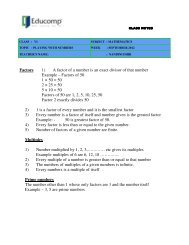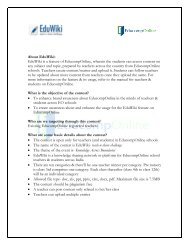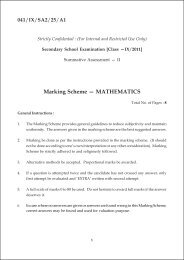THE FRENCH REVOLUTION - Educomp Online
THE FRENCH REVOLUTION - Educomp Online
THE FRENCH REVOLUTION - Educomp Online
Create successful ePaper yourself
Turn your PDF publications into a flip-book with our unique Google optimized e-Paper software.
Notes by Geeta Kumar<strong>THE</strong> <strong>FRENCH</strong> <strong>REVOLUTION</strong>Q1 Briefly discuss the causes of the French Revolution of 1789.The causes of the French Revolution can be broadly classified as-1. Political causes- Absolute monarchy based on the Divine Rights of the King was prevalent in France.The Monarch lived in splendor and cared little for the welfare of the subjects. The wholeadministration was corrupt and high posts were often auctioned.2. Social Causes- The French society was ridden with several inequalities. The society was divided into 3estates. While the first 2 estates enjoyed all the privileges, the third estate lived a life of misery. Theentire burden of taxation also fell almost entirely on them.3. Economic Causes- France had been continuously involved in wars which almost ruined her economy.Louis XVI had inherited an empty treasury. He still wasted money in liberating the 13 colonies ofAmerica from the common enemy Britain. Only a fraction of the taxes could be realized as those whohad to pay were too poor to pay taxes while those who could pay like the nobles, clergy etc. wereexempted from it.4. Intellectual Causes- Political thinkers like Rousseau, Voltaire, Montesquieu, Locke etc. exposed the illsof the French government and the administration which made the people aware of their rights andthe duties of the government. It also propounded theories for an ideal form of government. All thesecaused hatred against the crown nobles and the clergy.5. Immediate Cause- Forced by financial bankruptcy, Emperor Louis XVI was compelled to call a meetingof the Estates General in 1789 after a lapse of175 years. It was necessary to impose / increase taxes.The third estate demanded one vote for every delegate. But when the first two estates refused it themembers of the third estate walked out in protest.Q2Which groups of the French Society benefitted from the revolution? Which groups were forced to relinquishpower? Which sections of the society would have been disappointed with the outcomes of the Revolution?The benefitted groups1. The peasants benefitted the most as the French revolution destroyed the feudal system and all thelaws of the Old Regime.2. The Third estate which had to pay all the taxes and also bear the humiliation of the nobles and theclergy were now treated to be equal with the upper sections of the society.The disappointed groups1. The groups of nobles were adversely affected by the French Revolution as all their feudal privilegeswere abolished. The nobles were forced to relinquish power.2. The privileges of the clergy was taken away and church lands were confiscated.3. Even the common people were not happy as the non tax payers were classified as passive citizens inFrance.4. The women were unhappy as they had taken equal part in the French Revolution but the constitutionof 1791 declared them as passive citizens and denied all political powers to them.Q3Describe the legacy of the French Revolution for the people of the world in the 19 th and the 20 th century. The people of the world immensely benefitted from the revolution of the French People for liberty,equality and fraternity.1. The French Revolution put an end to the arbitrary rule and developed the concept of People’sRepublic in Europe and subsequently in other parts of the world1
Q42. It inspired the people throughout the world with the ideals of freedom and liberty. . In fact duringIndia’s struggle for freedom our national leaders looked up to the French people and took inspirationfrom their revolution3. The French Revolution preached the concept of equal rights to all the citizens which ultimatelybecame the guiding force of democracy all over the world.4. The French Revolution gave the term nation its modern meaning and promoted the concept ofnationalist and nationalism.5. The French Revolution had a great salutary effect on the ruling monarchs who took efforts to ensurepeoples welfare by introducing many reforms so that they do not loose their power to the people’srevolution.Draw a list of democratic rights we enjoy today whose origins can be traced to the French Revolution.1. The Right to Freedom or Liberty- The origin of the Right to Freedom can be traced to the Declarationof the Rights of man and citizens which laid emphasis on personal liberty as the Right of commonpeople.2. Right of Equality- Equality was one of the main principles of the French Revolution which led tospecial Rights of the common people and established political, economic and social equality.3. Inspiring the spirit of democracy- The French Revolution inspired the spirit of democracy whichensured all other rights that we enjoy today. It laid stress on the principle on the principle that thegovernment should not only be for the people but also by the people.4. End of slavery-Slavery is the inhuman practice in which humans were traded. They were tightlypacked in ships for 3 months voyage across Atlantic to the Caribbean. The convention of 1794 madethe slaves free even in the French overseas possessionsQ5Would you agree with the view that the message of Universal Rights was beset with contradictions? Explain.Yes, the study of the revolutions and the institutions established clearly suggests that the message ofUniversal Rights was beset with contradictions.1. Women were not given political rights as like men despite their active role and contribution to theFrench Revolution.2. Citizens were classified as active and passive based on the taxes paid by them that is their financialcondition.3. Equality and freedom were the central ideas for the revolutionaries and though slavery was abolishedin France, it was not applicable on the French colonies until 1848.4. The task of representing the people was given to the rich. To qualify as an elector and then asmember of the assembly, a man had to belong to the highest bracket of tax payers.Q6 Give an estimate of the work of the national assembly (1789-1791).1. Abolition of Rights to the privileged class. It put an end to feudalism and serfdom.2. Church was nationalized.3. Declaration of Rights of Man and Citizens which gave many Rights to ordinary citizens.4. It framed a new constitution in 1791 and adopted constitutional monarchy for France.5. Taxes were abolished.Q7What is Subsistence Crisis? Explain the causes that led to subsistence Crisis.Subsistence Crisis is an extreme situation where the basic means of livelihood are endangered.The causes of Subsistence Crisis are-1. The population of France rose from 23 million in 1715 to 25 million in 1789. This led to a rapidincrease in the demand for food grains.2
2. Production of grains could not keep pace with the demand. So the price of bread which was the staplediet of the majority rose rapidly.3. The labours got fixed wages which did not rise with the rise in prices.4. The gap between the rich and the poor widened.5. This led to subsistence crisis which occurred frequently in France of the old regime.Q8Explain Tithe and Taille.1. Tithe and Taille were a type of tax to be paid by the 3 rd Estate.2. Tithe was to be paid to the Church while Taille was paid to the King3. Tithe was paid in the form of one tenth of agricultural produce whereas Taille was levied on articles ofeveryday consumption such as salt, tobacco etc.4. The payment of Tithe and Taille did not benefit the third estate at all as neither the King nor theChurch used the tax money for the welfare of the people.5. The First and the second estate collected the taxes and benefitted from it.Q9Describe the role of the philosophers in the French Revolution. The role of the philosophers in the French Revolution is very important as they played a key role inarousing political aspirations in the minds of the French people. The ideas envisaging a society based on freedom and equal laws and opportunities for all etc were putforward by the philosophers.1. Rousseau- His ideas are propounded in his famous book “The Social Contract”. It invoked the Frenchpeople with the sentiments of freedom, equality and justice and proposed a form of governmentbased on a social contract between people and their representatives.2. Montesquieu- In his book “The Spirit of laws” he stressed upon the concept of the separation ofpowers of the executive, legislative and the judiciary as a pre requisite to eliminate corruption fromadministration.3. Voltaire- He was a revolutionary thinker and writer. He exposed the evils prevailing in the Churchand the administration.4. John Locke-In his book, Two Treatises of Government, he criticized the divine and absolute rights ofthe rulers.Q10What is the Old Regime? Describe the socio-economic condition of France in the old regime. The term old regime refers to the society and institutions of France before 1789.Socio Condition1. The French Society in the Old Regime was divided into 3 Estates.2. The First Estate consisted of the Clergy who collected the tax Tithe and the Second Estate consisted ofthe Nobility who collected Taille.3. The Third Estate consisted of the peasants, artisans, lawyers, and court officials etc who had toshoulder the entire burden of taxation.4. The nobility and the clergy enjoyed feudal privileges while the peasants were required to renderservices to them.Economic Condition1. The French treasury was empty due to long years of wars and the cost of maintaining the extravagantcourt at the palace of Versailles.2. France was under huge debt and the money lenders were charging 10% interest on loans.3. The extreme burden of taxation was on the Third Estate who had to pay both the taxes- Tithe andTaille.3
Q11 Why did Louis XVI find an empty treasury in 1774?In 1774 Louis XVI of the Bourbon family of Kings ascended the throne of France. Upon his accession the kingfound an empty treasury because-1. Long years of Wars had drained the financial resources of France.2. It was extremely expensive to maintain the extravagant court at the Palace of Versailles.3. France had helped the 13 American colonies from the common enemy Britain.4. The government had to pay huge sums to meet its its regular expenses such as the cost of maintainingan army, the court, running government offices& Universities. As such the state was forced toincrease taxes.5. The government had taken loans from the money lenders who charged heavy rates of interest. Assuch the French government was obliged to pay an increasing percentage of its budget on interestpayment alone.Q12 Describe the meeting of the Estates General in 1789.1. The Estates General was a political body to which the three estates sent their representatives.2. In France of the Old regime, the monarch did not have the power to impose taxes according to his willalone rather he had to call a meeting of the Estates General which would pass his proposal.3. On 5 th May 1789, Louis XVI called together a meeting of the Estates General to pass proposals for newtaxes.4. The first and the second estate sent 300 members each while there were 600 members of the thirdestate .5. Louis XVI wanted to give every estate one vote as per the old practice.6. But the members of the third estate demanded that voting be conducted by the assembly as a wholewhere each member would have one vote.7. When the King rejected this proposal, members of the third estate walked out of the assembly inprotest and declared themselves as the National Assembly.8. Tennis Court Oath- The members of the third estate collected in the Tennis Court of the Palace ofVersailles declared themselves as National Assembly and vowed not to disperse till they had drafted aconstitution for France which would limit the powers of the monarch.Q13Why did Louis XVI agree to limit his powers?1. While the National Assembly was busy at Versailles drafting a constitution, the rest of France seethedwith turmoil.2. A severe winter and bad harvest led to food crisis. Bakers exploited the situation and hoardedsupplies.3. The king ordered the troops to move into Paris. As a result the agitated crowds stormed anddestroyed the Bastille.4. Peasants in several districts seized hoes and pitch forks and attacked the Chateau.5. Faced with the powers of his revolting subjects, Louis XVI finally accorded recognition to the nationalassembly and accepted in principle that his powers would from now on be checked by a constitution.Q14State the provisions of the constitution of 1791 of France.1. The National Assembly completed the draft of the constitution in 1791 that limited the powers of themonarch thus making France a constitutional monarchy.2. Powers were now separated and assigned to different institutions- the executive, the legislature andthe judiciary.3. The Constitution of 1791 vested the powers to make law in the National Assembly.4
4. Only men above 25 years of age who paid taxes equal to at least 3 days of labourer’s wage were giventhe status of active citizens. The remaining men and all women were classified as passive citizens.5. Only active citizens were entitled to vote.6. The property of the church was confiscated and feudal obligations withdrawn.Q15 What were the rights granted to the citizens of France by the constitution of 1791? The Declaration of the Rights of Man and Citizens granted the following rights to Citizens of France.1. Men are born and remain free and equal in Rights.2. The source of all sovereignty resides in the nation. No group or individual may exercise authority thatdoes not come from the people.3. Liberty consists of powers to do whatever is not injurious to society.4. No man may be accused arrested or detained except in cases determined by the law.5. Every citizen may speak, write and print freely. He must take responsibility for abuse of such liberty incase determined by law6. The law has the right to forbid only actions that are injurious to the society.Q16Explain the circumstances that led to the rise of the Jacobin.1. King Louis XVI had entered into secret negotiations with the ruler of Prussia leading the NationalAssembly to declare war against Prussia and Austria in April 1792.2. Thousands of volunteers from the provinces thronged the streets of Paris to join the Army.3. While the men were away fighting in the front the women were left with the task of earning alivelihood and looking after the families.4. Large sections of the population was convinced that the revolution needed to be carried further asthe constitution of 1791 gave political rights only to the richer sections of the society.5. Political clubs became an important rallying point for people who wished to discuss political policiesand plan further course of action. The most successful of these clubs was that of the Jacobins.Q17Describe the Jacobins Club and its members.1. The Jacobins club got its name from the Convent of St Jacobins in Paris. Its leader was MaximilianRobespierre.2. The members of the Jacobins club belonged to less prosperous sections of the society. They includedsmall shop keepers, artisans such as shoe makers, pastry cooks, watch makers, printers, servants anddaily wage workers.3. The Jacobins wanted to set themselves apart from the prosperous sections of the society and sodecided to wear long striped trousers like the dock workers without knee breaches. That is why theywere also known as sans-culottes literally meaning those without knee breeches.4. They also wore the red cap which symbolized liberty. However the women were not allowed to do so.5. In the summer of 1792 the Jacobins planned an insurrection as they were angered by short suppliesand high prices of foods.6. On August 10, 1792 the Jacobins stormed the palace of Tuileries. They killed the guards andimprisoned the kingQ18Analyze the reign of terror by Maximilian Robespierre.1. The period from 1793 to 1794 is referred to as reign of terror as Robespierre followed a policy ofsevere control and punishment.2. All those whom he saw as enemies of the Republic such as ex-nobles, clergy, members of otherpolitical parties and even his own party members who did not agree with his methods were arrested,5
imprisoned and then tried by a revolutionary tribunal. If the court found them guilty they wereguillotined.3. Robespierre’s government issued laws placing a maximum ceiling on wages and prices. Meat andbread was rationed. White flour was forbidden. All the citizens were required to eat the equalitybread, a loaf made of whole wheat.4. Equality was also sought to be practiced through forms of speech and address. Instead of thetraditional Monsieur (Sir) and Madame (Madam) all French men and women were henceforth to bereferred as Citoyen and Citoyenne (Citizen).5. Churches were shut down and their buildings were converted into barracks or offices. Even the clubsof women were shut down.6. Peasants were forced to transport their grains to the cities and sell it at prices fixed by thegovernment.7. He introduced equality in dressing for men by introducing red liberty cap, stripped trousers andbanning knee breeches.Q19What is Directory? Why was it established? What led to its fall?1. After the fall of the Jacobin Government, a new constitution was formed. It provided for 2 electedlegislative Council.2. These then appointed a Directory which was an executive made up of 5 members.3. This was meant to be a safeguard against concentration of power in one man executive as under theJacobins.4. However the Directors often clashed with the Legislature who then sought to dismiss them.5. The Political instability under the Directory paved the way for the rise of the military dictatorNapoleon Bonaparte.Q20How would you explain the rise of Napoleon? Explain the reforms introduced by him.1. The rule of the Directory created Chaos, confusion and instability as the Directors could never reachto any conclusion.2. Taking advantage of this situation, Napoleon crowned himself as the Emperor of France in 1804.3. He set out to conquer the neighboring countries of Europe. He disposed dynasties, created kingdomswhere he placed members of his family.4. Initially many saw Napoleon as a liberator but soon Napoleonic army came to be viewed everywhereas an invading force.5. Napoleon saw his role as a modernizer of Europe and introduced many laws such asa)Protection of private propertyb) Uniform system of weights and measures provided by the decimal system6. Napoleon was finally defeated at Waterloo in 1815.Q21List the Rights demanded by Olympe de Gouges in her declaration of rights of women and citizens1. Olympe de Gouges was one of the most important of the politically active women in revolutionaryFrance.2. Some of the basic rights set forth in Olympe de Gouges declaration area)A woman is born free and remains equal to man in rights.b) The goal of all political associations is the preservation of the natural rights of woman andman. These rights are liberty, property, security and above all resistance to oppression.c) The law should be the expressions of the general will, all female and male citizens should havea say either personally or through their representatives in its formulation. It should be thesame for all.6
d) The source of all sovereignty resides in the nation which is nothing but the union of man andwomen.e) No woman is an exception. Women like men should obey the rigorous laws.Q22What was the condition of women in the old regime? How did it change in the New Regime?1. In the old regime, the women did not have basic rights.2. Most women did not have access to education and job training.3. Their wages were lower than that of men.4. Daughters were forced to marry the person of their parent’s choice.5. Even though the women took active part in the French Revolution, The new constitutions declaredthem as passive citizens and denied them their political rights.6. In order to discuss their interests, the women started their own political clubs and newspapers. About60 women’s clubs came up in different French cities. The Society of the Revolutionary and Republicanwomen was the most famous of them.7. The following changes were observed in the new regimea)Schooling was made compulsory for girls.b) Their fathers no longer forced them to marry against their will.c) Marriage was made into a contract entered into freely and registered under the Civil law.d) Divorce was made legal and could be applied for by both men and women.e) Women could now train for jobs.Q23What were the reasons for slave trade? Write a note on slavery in France.1. The colonies in the Caribbean were important suppliers of tobacco, indigo, sugar and coffee. Howeveras the Europeans were unwilling to work in distant and unfamiliar lands, it led to a shortage of labor inplantations. This shortage was met by triangular slave trade between Europe, Africa and America.2. The slave trade began in the 17 th century when French merchants sailed to the African coasts, wherethey bought slaves from the local chieftains. These slaves were then branded, shackled and thenpacked tightly into ships for a 3 month long voyage across the Atlantic to the Caribbean.3. There they were sold to the plantation workers who used them to meet the growing demands inEuropean markets for sugar, coffee and indigo.4. Slavery was abolished in France by the Constitution of 1791 but it was not extended to all Frenchsubjects including those in the colonies.5. It was during the Jacobins reign that the Convention abolished slavery in the French colonies in 1794.Napoleon re introduced slavery in France. Slavery was finally abolished in French colonies in 1848.Q24Describe in detail the political symbols of the French Revolution.(Do it on your own)7


